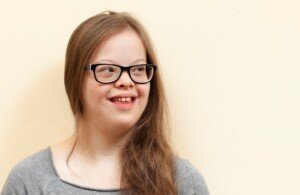Almost every article I’ve ever read about Down syndrome has the word suffer.
These days, though, journalists and bloggers are more aware of the descriptors they use when referring to someone with Down syndrome.
But there definitely was a time, years ago, when you could bet that most articles that contained a reference to someone’s child or teen who had Down syndrome — used the words “suffers from.”
It goes as follows: John Doe, who suffers from Down syndrome…or, it could go like this: Jane Doe has a young daughter who suffers from Down syndrome.
Non-journalists do it too, in that they think a child or adult with Down syndrome “suffers.”
I’ve written several articles for print publications about a teen girl with Down syndrome — not a girl who suffers from Down syndrome. I wrote it out as: She has Down syndrome.
She had earned a black belt in karate as a teen, which was why I wrote about her.
She had gotten her driver’s license, and her parents had even bought her a car.
To say she suffers from anything doesn’t fit at all. She eventually got a part-time job at a clothing store. Kind of doesn’t quite meet the criteria for “suffers.”
Of course, there are people with Down syndrome who have major struggles including heart problems and deafness.
But I’ve found that in many of the referenced articles, the author didn’t know much about the child with Down syndrome — only that the adult they were talking about had a child with Down syndrome.
Often, the child’s name wasn’t even mentioned. The author had taken it upon themselves to say they “suffered from.”
Why not just say, “He has Down syndrome”?
I don’t live with them, nor do I see them often enough to know their lifestyle circumstances.
So where would I get off, then, using the word suffers in my articles about someone with Down syndrome?
What’s amazing is that the parents of kids or adults with Down syndrome let journalists get away with this.
Don’t parents ask to read an article first, before the writer sends the final version off to the editor?
You’d think that any parent reviewing an article, in which info about their child with Down syndrome is included, would be quite irritated at that word suffers.
A good journalist will replace “suffers” with a kinder word upon request.
The irony is that sometimes, the parents will talk about what an angel her child is, how loving this child is, how everyone’s her friend, how she’s always smiling — after the writer says this child suffers from Down syndrome.
If you believe someone thinks your child is suffering, ask them, “When’s the last time you saw someone with Down syndrome who appears to be suffering?
“In fact, don’t they always appear to be the happiest people in the room?”
Then be silent and gloat in the pride of making the skeptic realize his or her blunder.
Or, you can say, “Have you ever seen a disgruntled child with Down syndrome?”
Children with Down syndrome who are very high functioning know they are “different.” But even THEY seem to have a happy disposition as well.
“Look into my child’s face next time you see her, and tell me if you see any suffering,” you might say to the skeptic.
Parents say their kids with Down syndrome — children as well as adults — have a sunny, content disposition, enjoy affection and have brought tremendous joy to the family. Many have full-time jobs. Who’s suffering?
When I hear the word suffer, I think of someone who lives in pain, experiences mental anguish, battles drug addition, has debilitating lupus, diabetes or some other medical sickness, lives with an alcoholic, etc.
People suffer from paralysis, cancer, depression and schizophrenia.
Though nobody wants their newborn baby to be diagnosed with any genetic anomaly, at the same time, I doubt anyone with this condition would describe themselves as suffering from it.
This is why many people with the condition say they have Up syndrome.



























